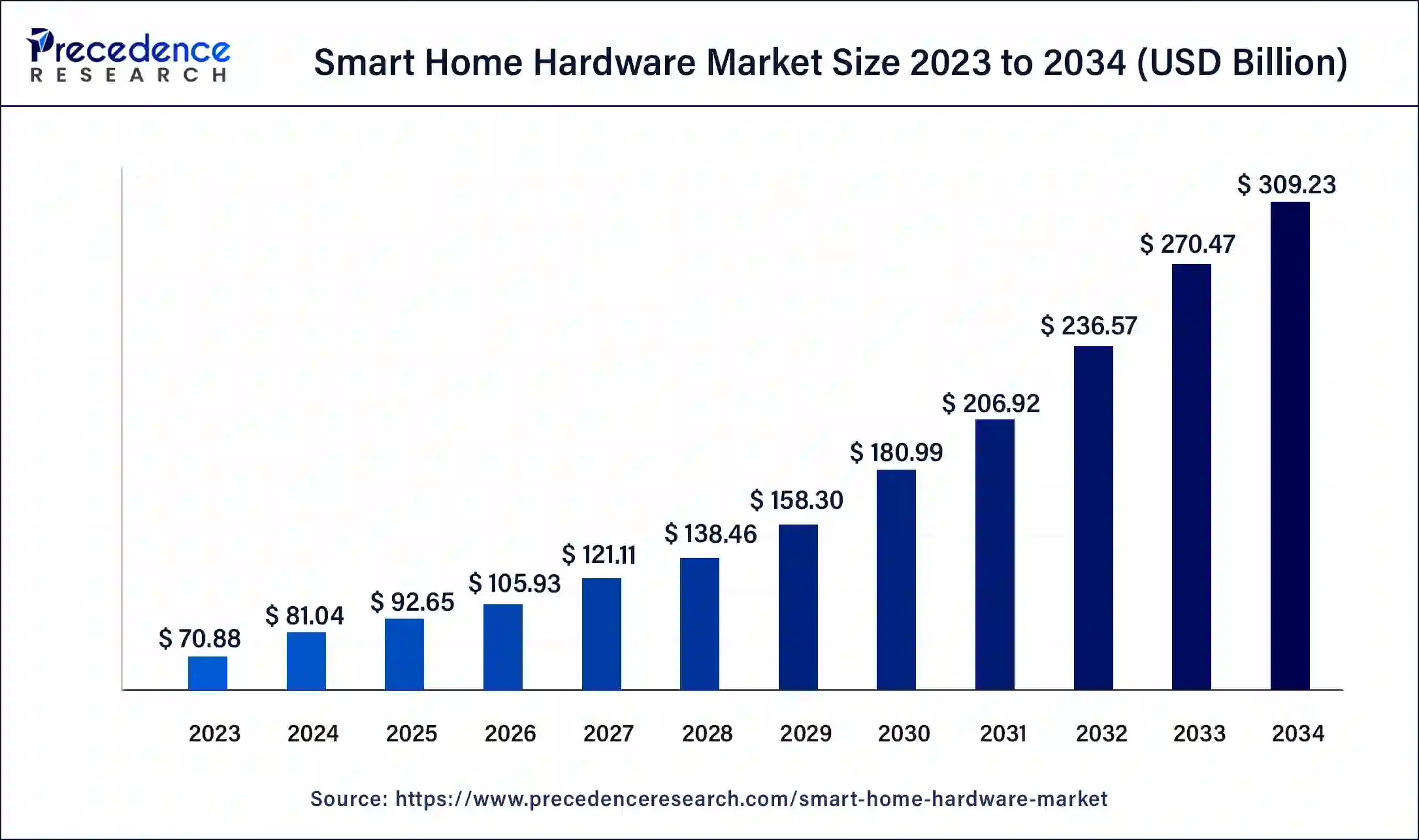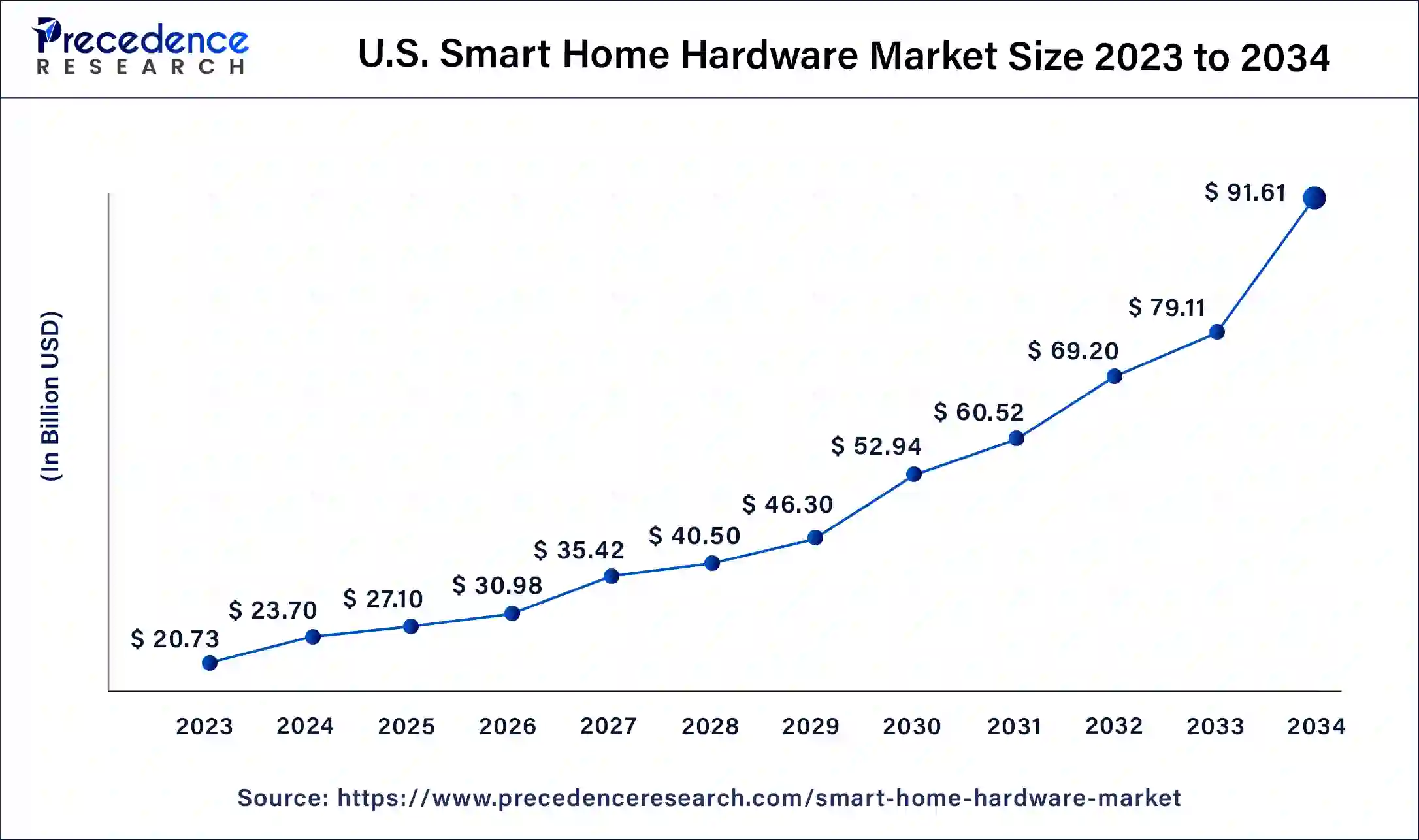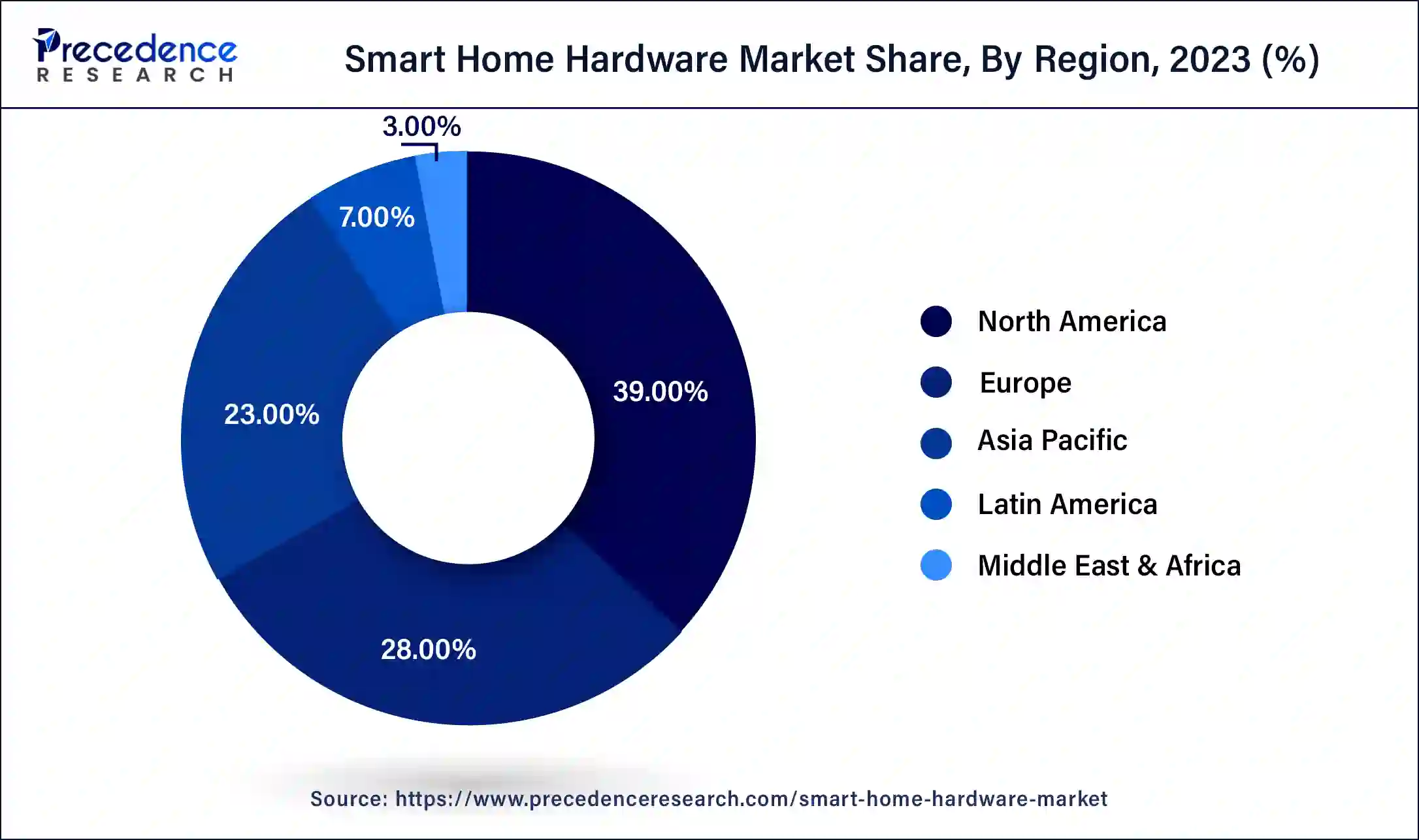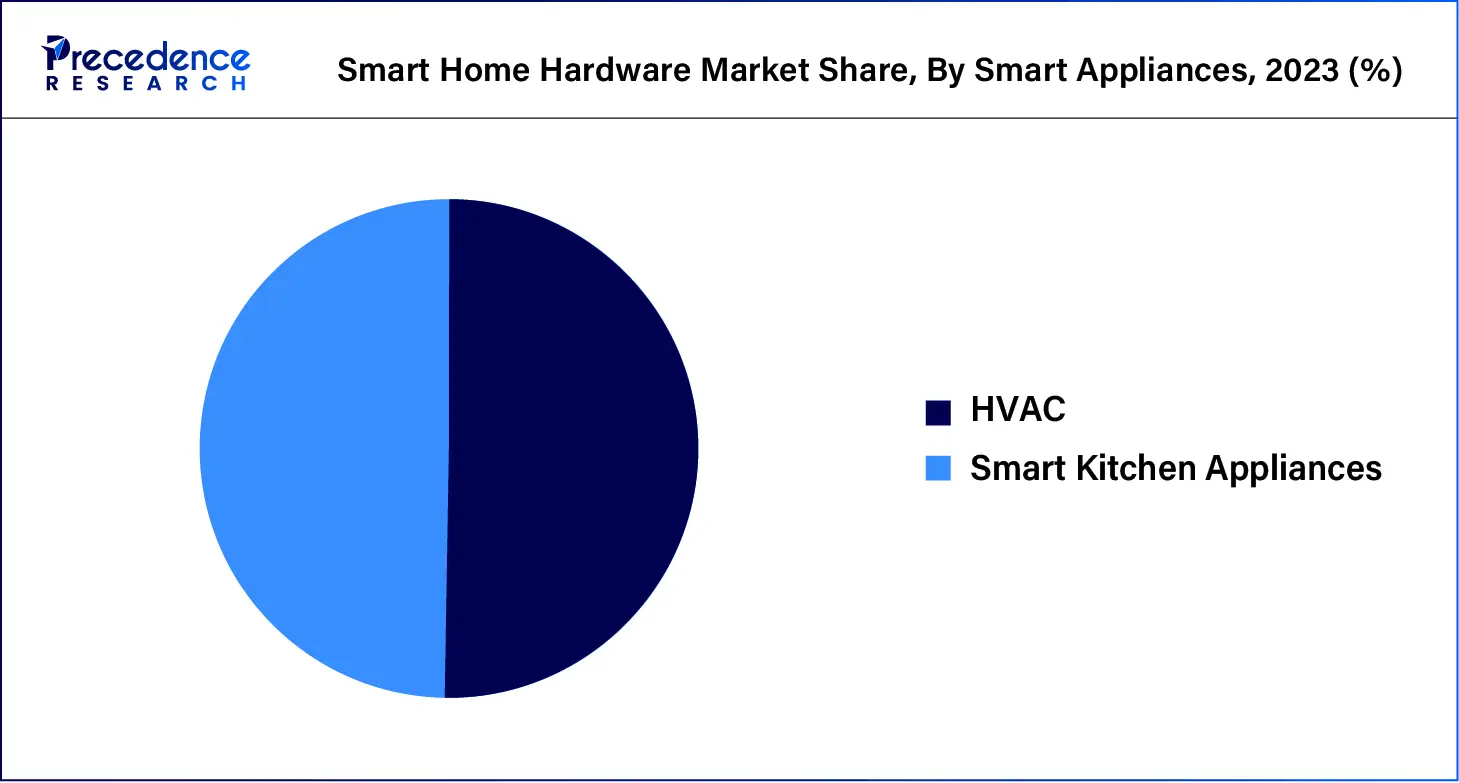August 2024
The global smart home hardware market size was USD 70.88 billion in 2023, estimated at USD 81.04 billion in 2024 and is anticipated to reach around USD 309.23 billion by 2034, expanding at a CAGR of 14.33% from 2024 to 2034.
The global smart home hardware market size is projected to be worth around USD 309.23 billion by 2034 from USD 81.04 billion in 2024, at a CAGR of 14.33% from 2024 to 2034. Rising internet penetration, including innovative and cutting-edge technologies, and increasing disposable income of masses across the globe are fuelling the growth of the smart home hardware market significantly.

The U.S. smart home hardware market size was valued at USD 20.73 billion in 2023 and is predicted to cross around USD 91.61 billion by 2034, at a CAGR of 14.46% from 2024 to 2034.

North America accounted for the largest share of the smart home hardware market in 2023. North America is home to innovative and smart home products that enhance energy efficiency; therefore, it's expected to expand further in the near future. Moreover, major key players like Amazon and Google have headquarters in North America, again fuelling the region's growth exponentially. The rising popularity of voice-assisted gadgets like Alexa and Siri has seen a notable surge in the market due to their ease of use and the features they provide. Hence, North America is the largest marketplace for smart home devices.

Asia Pacific is expected to host the fastest-growing smart home hardware market throughout the forecast period. The growth of the region is attributed to multiple factors like increasing disposable income, rise in the standard of living, rapid penetration of the internet due to the evolving electronic and communication sector in the region along with the rising pace of digitalization in the region further propels the region's growth exponentially. Moreover, the growing need to minimize carbon emissions is also impacting the market in Asia Pacific. Economically evolving countries like India, Japan, and China are the biggest contributors to the market.
The smart home hardware market is expected to witness prominent growth during the foreseeable period owing to the technological advancements that are applicable to the hardware of homes. Smart homes are basically technically sound household applications like light bulbs, doorbells, locks, windows, vacuums, refrigerators, dryers, washers, etc. These appliances can work collaboratively due to the connection built up between them via the internet or chip, or often both ways, so that these systems can work like a single system and automate themselves as per instructions. Basically, it acts like a network of devices known as internet of things (IoT). This connectivity offers three things: communication with other connected devices, over-the-air updates, and remote control.
Smart homes can be considered safer spaces to live in due to the alarm systems that can automatically instruct the devices according to the time set for them, making them more energy-efficient places. For example, lights can be automatically turned off by using sensors if someone isn't at home, or devices in the home can be controlled remotely by us. Another recent update in the market is Samsung's smart things energy service, which uses AI to automatically adjust energy usage based on data collection.
Despite the multiple benefits offered by the smart home hardware market, the security concerns might create hindrances in adopting the same as individuals' data gets collected by every system and their source company, which is a kind of invasion of privacy, and it also gets misused by unknown entities. As the technology evolves with time, restraining factors may diminish over the foreseeable period to aid in the market expansion.
List of must-have smart gadgets for smart home
| Gadgets | Key Features |
| Smart lighting |
|
| Smart displays |
|
| Smart thermostat |
|
| Smart plugs |
|
| Smart locks |
|
| Smart appliances |
|
| Smart security camera |
|
AI Impact on the Smart Home Hardware Market
AI is creating waves in every sector; the smart home hardware market is not an exceptional sector that doesn't leverage its tremendous offerings. One of the beautiful facets of AI technology is that it never stops learning and is adaptable to every evolving field with a constant source of data. The same thing goes with the integration of AI into smart home hardware. AI has an advanced algorithm that can learn the behavior patterns of the individual living in the home by analyzing the input and feedback that continuously redefines their precise nature and performance over time.
By leveraging machine learning algorithms for smart homes, systems can easily recognize your preferences, daily routine, habits, and working patterns, leaving time from home, which, in turn, allows these systems to work based on pattern recognition. Thus, artificial intelligence (AI) power systems can enhance the experience of users while providing unique solutions that will align with individual's lifestyle, making them more comfortable in the home. AI-powered systems in the smart home hardware market can provide advantages like a centralized hub for commands, remote control, tailored automation routines, increased security features, energy-efficient optimization, the convenience of voice activation, and seamless integration with smart devices, providing a comprehensive solution to multiple problems including safety feature for homes.
| Report Coverage | Details |
| Market Size by 2034 | USD 309.23 Billion |
| Market Size in 2023 | USD 70.88 Billion |
| Market Size in 2024 | USD 81.04 Billion |
| Market Growth Rate from 2024 to 2034 | CAGR of 14.33% |
| Largest Market | North America |
| Base Year | 2023 |
| Forecast Period | 2024 to 2034 |
| Segments Covered | Type and Region |
| Regions Covered | North America, Europe, Asia-Pacific, Latin America, and Middle East & Africa |
Enhanced security with the help of innovative technology
One of the significant driving factors that is propelling the growth of the smart home hardware market is enhanced ways to secure homes with the help of innovative technology. Smart homes can have smart lights, bulbs, speakers, a digital wireless and programmable heating device, smart kitchen appliances, etc, which can be programmable and highly scalable, which makes all the home chores done conveniently, better than the manual method. Automation in smart homes saves time and allows a home to be more energy efficient. In simple words, by leveraging cutting-edge technologies, smart homes can simplify daily tasks that used to be time-consuming once and save time, which can engage in other fruitful and creative work, making the human lifestyle more impactful.
Costly repairs and hacking concerns
One of the major restraints that holds back the progress of the smart home hardware market is costly repairs and hacking concerns. Since the technology of smart homes is in its state-of-the-art position, there are vulnerabilities that may be hindering the adoption of smart homes in many places. Security concerns are notable because the whole system of a home is centralized, connected to mobile applications, and, thus, accessible easily to harmful entities by using hacking, and possibly an unknown can get control of the home or get into a home in the absence of homeowner and makes unwanted changes to spy over people in the home that causes threatening situation for the people within the home. In some cases, it is even possible that hackers might lock the home, which makes it hard for the enforcement and police systems to override the situation, causing panic among the homeowners.
Moreover, the smart home hardware market products and services are not an affordable option for everyone, specifically for the middle-class population where disposable incomes are minimal or nearly zero; spending on such technology is, therefore, a costly thing to adopt. The cost of connected devices is an expensive affair, and repairing these highly technological devices adds up to the estimation again, including the need for continuous, high-quality wi-fi within the space, which costs more than usual.
Robotics application
One of the significant opportunities that the smart home hardware market holds is home robotics. Robotics is one of the most anticipated features that is trying to be implemented by many sectors like agriculture, manufacturing, civil, and construction sites, and it extends into the market. Home chores like cleaning and washing are mundane tasks, repetitive tasks that can be completed by using programmable robots in smart homes. Further, robots can act as assistants too for babysitting and elderly care. The possibilities are endless and up to our imagination, as well as innovations in cutting-edge technologies. Advancements in robotics provide endless assistance and companionship while improving the quality of human life and convenience. These are factors that again aid in propelling the growth of the market on a global scale.
The smart appliances segment is estimated to have a substantial share in the smart home hardware market in 2023. The growth of this segment is attributed to various factors, including an inclination towards a convenience-seeking approach for daily home chores due to the busy lifestyles across the globe. Manufacturers of smart home hardware across the globe recognize these demands and launch multiple smart appliances that help with kitchen chores. Smart appliances include refrigerators, dishwashers equipped with AI features and wi-fi connectivity, touchscreen controls, cameras inside the fridge to scan the quality of food, etc. Penetration of internet connectivity with innovative smart hardware products launched is fuelling the growth of the market globally.

The control & connectivity segment showcases the fastest growth in the smart home hardware market during the forecasted years. The growth of this segment is due to the proliferation and development of the communications system with intelligent connectivity. Connectivity irrespective of places, mobile connectivity provides better control to the smart homeowners. Communication protocols like wi-fi, Bluetooth, Z wave, and ZigBee also aid in market expansion on a wider scale.
Segments Covered in the Report
By type
By Geography
For inquiries regarding discounts, bulk purchases, or customization requests, please contact us at sales@precedenceresearch.com
No cookie-cutter, only authentic analysis – take the 1st step to become a Precedence Research client
August 2024
December 2024
November 2024
October 2024